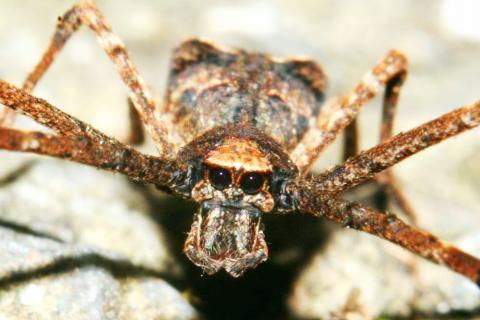A furniture shop owner from Greater Kaohsiung has cast new light on a rare arachnid known as the “ogre-faced spider.”
Hsu Kun-chin (許坤金) published his findings on the shedding and mating processes of the Deinopis spider genus in last month’s edition of the 2011 Nature Conservation Quarterly.
His publication in a magazine run by the Executive Yuan’s Endemic Species Research Institute has earned him tremendous feedback.

Photo provided courtesy of Hsu Kun-chin
Taking time out from manning his shop, Hsu joined the Kaohsiung Natural Observation Association (NOA) because of his fascination with gardening and frequently went with other like-minded friends on field trips to take pictures of ecological habitats.
During an observation trip in May 2008, he happened upon a strange type of spider in the mountains around the former Liouguei Township (六龜) that NOA chairman Chen Jen-jie (陳仁杰) later said belonged to the rare Deinopis spider genus.
The Deinopidae family consists of stick-like elongated spiders that weave unusual webs they suspend between their front legs. They then stretch the web to two or three times its initial length and cast it onto their prey, entangling it in their web.
The practice has also earned it the nickname “net-casting spider.”
Hsu said the Deinopis genus of the Deinopidae family is quite rare, both in Taiwan and abroad.
Because Deinopis are nocturnal and brown-colored, they are extremely difficult to notice when they hide amid trees in daytime, Hsu said, adding that to study the unique habits of the Deinopis more closely, he had visited the mountains 23 times.
“Though I often encountered boars and poisonous snakes on those trips, I never wavered from my goal,” Hsu said, adding that he had also brought some Deinopis spiders back home to keep.
The spiders’ nocturnal habits initially created problems for Hsu’s family, but they eventually came to support his passion after seeing how engrossed he was in his research.
During his research, Hsu discovered that the shedding process of the Deinopis did not match the description in textbooks.
Even more rare, Hsu managed to take pictures of the male Deinopis weaving a sperm web, which is used for mating.
The Deinopis’ mysterious comings and goings, as well as its particular way of hunting, are a fascinating subject, Hsu said, adding that he hoped that by sharing his observations with the public, more people would develop an interest in, and a desire to protect, the rare arachnid.
TRANSLATED BY JAKE CHUNG, STAFF WRITER

‘DENIAL DEFENSE’: The US would increase its military presence with uncrewed ships, and submarines, while boosting defense in the Indo-Pacific, a Pete Hegseth memo said The US is reorienting its military strategy to focus primarily on deterring a potential Chinese invasion of Taiwan, a memo signed by US Secretary of Defense Pete Hegseth showed. The memo also called on Taiwan to increase its defense spending. The document, known as the “Interim National Defense Strategic Guidance,” was distributed this month and detailed the national defense plans of US President Donald Trump’s administration, an article in the Washington Post said on Saturday. It outlines how the US can prepare for a potential war with China and defend itself from threats in the “near abroad,” including Greenland and the Panama

A wild live dugong was found in Taiwan for the first time in 88 years, after it was accidentally caught by a fisher’s net on Tuesday in Yilan County’s Fenniaolin (粉鳥林). This is the first sighting of the species in Taiwan since 1937, having already been considered “extinct” in the country and considered as “vulnerable” by the International Union for Conservation of Nature. A fisher surnamed Chen (陳) went to Fenniaolin to collect the fish in his netting, but instead caught a 3m long, 500kg dugong. The fisher released the animal back into the wild, not realizing it was an endangered species at

The High Prosecutors’ Office yesterday withdrew an appeal against the acquittal of a former bank manager 22 years after his death, marking Taiwan’s first instance of prosecutors rendering posthumous justice to a wrongfully convicted defendant. Chu Ching-en (諸慶恩) — formerly a manager at the Taipei branch of BNP Paribas — was in 1999 accused by Weng Mao-chung (翁茂鍾), then-president of Chia Her Industrial Co, of forging a request for a fixed deposit of US$10 million by I-Hwa Industrial Co, a subsidiary of Chia Her, which was used as collateral. Chu was ruled not guilty in the first trial, but was found guilty

The Chinese Nationalist Party (KMT) is maintaining close ties with Beijing, the Democratic Progressive Party (DPP) said yesterday, hours after a new round of Chinese military drills in the Taiwan Strait began. Political parties in a democracy have a responsibility to be loyal to the nation and defend its sovereignty, DPP spokesman Justin Wu (吳崢) told a news conference in Taipei. His comments came hours after Beijing announced via Chinese state media that the Chinese People’s Liberation Army’s Eastern Theater Command was holding large-scale drills simulating a multi-pronged attack on Taiwan. Contrary to the KMT’s claims that it is staunchly anti-communist, KMT Deputy